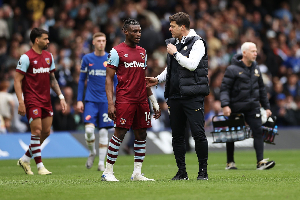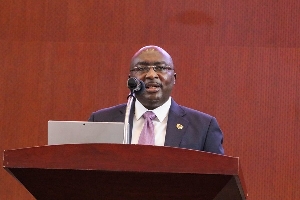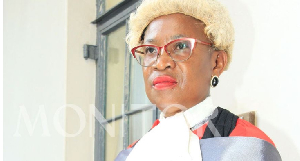- Home - News
- TWI News | TV
- Polls
- Year In Review
- News Archive
- Crime & Punishment
- Politics
- Regional
- Editorial
- Health
- Ghanaians Abroad
- Tabloid
- Africa
- Religion
- Election 2020
- Coronavirus
- News Videos | TV
- Photo Archives
- News Headlines
- Press Release
General News of Thursday, 3 March 2011
Source: GNA
Politicization of corruption and crime hinders fight against corruption
Wa, March 3, GNA - Mr. Charles Ayamdoo, a Director of the Commission on Human Rights and Administrative Justice (CHRAJ) in charge of Anti-Corruption, said the politicization of crime and corruption, coupled with the lack of effective collaboration between the Anti-Corruption Agencies were adversely affecting the fight against corruption in Ghana He said corruption no matter how small it was, retarded the development of the country.
Mr. Ayamdoo said this during a Regional consultative workshop on the Development of Ghana's National Anti- Corruption Action Plan (NACAP) at Wa on Wednesday.
He said the NACAP was a 10-year plan aimed at reducing corruption in the country, adding that the workshop, therefore, sought to elicit public views on what should be included in the plan to enable it to achieve its purpose.
Alhaji Issahaku Salia, Upper West Regional Minister, said
Consultations on NACAP when completed and the document
ratified by Parliament, would ensure effective coordination of
efforts and judicious use of resources in the fight against
corruption. According to him, NACAP would also form the basis for
assessing the performance of government and its institutions
including the private sector as anti-corruption activities would
be integrated into their programmes and activities. Alhaji Salia said the fight against corruption was a national
issue which was why Vice President Dramani Mahama
inaugurated the National Working Group which together with
the CHRAJ would play a leading role in the development of
NACAP. He said Ghana had over the years demonstrated its
commitment towards combating corruption through the
ratification of the United Nations Convention Against
Corruption (UNCAC), the African Union (AU) Convention
and the ECOWAS Protocol on Corruption. In addition, it established Anti-Corruption Agencies such as
CHRAJ and the Economic and Organised Crime Office
(EOCO). Alhaji Salia said despite all these interventions, corruption
still thrived in Ghana, saying the development of NACAP was
therefore timely and necessary. The Regional Minister identified institutional weaknesses,
poor ethical standards, lack of transparency and
accountability, weak enforcement of laws and gifts among
others as some of the causes of corruption in Ghana. Alhaji Salia said corruption did not only mean giving and
accepting bribes but also included embezzlement, patronage,
conflict of interest, theft and fraud among others. He said the fight against corruption must be a top priority
for Ghana and that efforts must seek to make corruption a high
risk, low-gain activity to discourage people from engaging in
corrupt practices. The Regional Minister urged the participants to contribute
ideas towards the development of NACAP for national
development.










